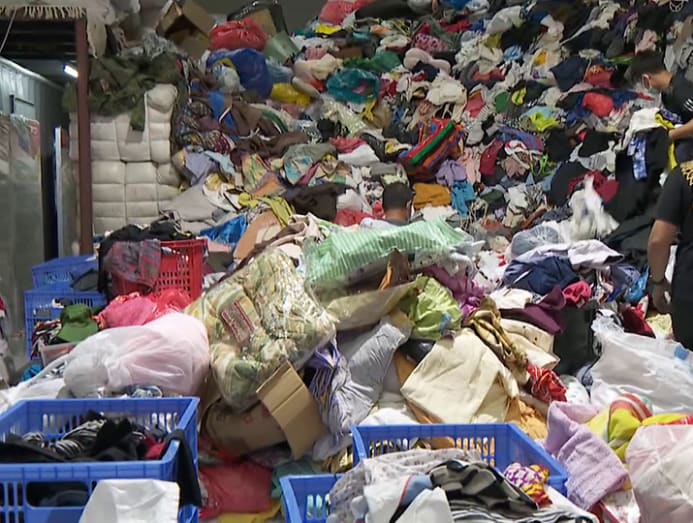'Normalise re-wearing clothes': Experts urge consumers to reduce impact of fashion on environment
SINGAPORE: Ms Taahira Mohamed Ayoob stopped buying fast way in an attempt to stand out from the oversupply.
She still wanted a variety of clothes to wear, and then she turned to clothes swapping. Only information technology has now get a way of life for her, fuelled by a desire to be more environmentally conscious.
A marketing and branding officeholder in the travel industry, the 29-year-erstwhile said she came to realise she doesn't need as many clothes every bit she had. And that she doesn't need something unlike to wear on each occasion.
"When the pandemic striking,I realised how petty clothes I needed to survive," Ms Taahira said.
When she needs to freshen up her expect, she adds an accessory or something to jazz up her outfit.
"It'due south possible to add on elements – a scarf, a jacket. I borrow from a friend, then return it. I accepted that I don't have to own something new to article of clothing it."
She said that while it is normal to feel self-conscious most being seen in the same clothes repeatedly, being okay with doing and then comes from a place of confidence.
"Actually, nobody cares (whether you're wearing the same outfit). It's our perception of what people think of u.s.a.," Ms Taahira said.

Apply YOUR EXISTING CLOTHES
Environmental experts said that the all-time fashion for people to be sustainable is to wear what they already have in their wardrobes. Swapping and renting clothes are the next best culling, they said, and buying new clothes the last resort.
Mr Raye Padit, founder and chief executive of swapping platform The Fashion Pulpit, said there is "no shame" in repeating outfits.
"Normalise re-wearing wearing apparel," he said.
"Nosotros have that passed-on belief that information technology's not okay to repeat wearing apparel, that information technology'south not sexy. We need to change that kind of mindset."
The most sustainable thing to exercise is to vesture what is already in your wardrobe, said marketing associate director of Zilch Waste SG Jasmine Tuan.
"Nosotros accept more enough apparel in our existing wardrobes. Do we really need to buy some other T-shirt, another wearing apparel, another pair of jeans?" she asked. "When you look at your wardrobe, you maybe already have these items. The next footstep is to wear information technology."
Otherwise, people tin consider re-gifting the items to friends and family unit or donate to organisations that will recirculate them responsibly, she said.
Ms Xingyun Shen, state coordinator of Fashion Revolution Singapore – a global grouping that calls for greater transparency, sustainability and ethics in the manner industry – suggested that people reconsider how they want to chronicle to their clothing.
What would happen if wearing apparel were non as cheap or readily attainable as they are now, she asked.
"How would we be shopping or acquiring 'new' wearing apparel? The beginning place nosotros would probably exist looking at is our wardrobes," she said, calculation that people could likewise await at friends' and family members' wardrobes.
"Can we borrow and swap clothing from our circle of friends and family? Can we ask our local seamstresses and tailors to fix a split seam or alter something to fit our bodies over again?"
ALTERNATIVES TO Ownership
Renting and swapping apparel is growing in popularity and acceptance by consumers in their choice of fashion, said Ms Carolyn Poon, sustainability manager at the Cloth and Fashion Federation, Singapore.
These alternatives to ownership clothes make the "have-make-dispose" linear way economy more circular, she said.
"This is the most direct way renting and swapping assist the surround. They extend the lifetime utilise of clothes that are already produced and consumed," she said.
Manner Theory, which offers customers subscription-based plans for renting clothes, has more 200,000 registered users, said its founder Raena Lim.
The firm has done more than than 2.three one thousand thousand rentals and saved more than 600,000 preloved designer wear from "prematurely inbound landfills" in the span of five years, she said.
Sustainability is one of the main pillars driving the firm, Ms Lim added.
"We know that 60 per cent of clothing produced ends upward in the landfill every year. With the rental model, we have shown that items are kept longer within the mode ecosystem, which reduces the demand to overproduce."
An item is rented an boilerplate of 30 times each, while an item in a women's wardrobe is used far less, she said.

Ms Lim acknowledged that the logistics and operations of a fashion rental business concern as well take a carbon footprint. She said Style Theory has found a good partner who uses environmentally friendly cleaning chemicals.
The business firm as well tries to reduce the number of commitment trips made, she said, adding that it is looking to become more sustainable over time.
Style Pulpit has also helped the environment, said Mr Padit. Since opening in 2018, the platform has saved 120,000 items with swapping, he said. The swapping community has also grown, from 115 members to two,500 currently.
While renting and swapping are touted as environmentally friendly solutions to buying, Ms Shen from Manner Revolution cautioned against doing too much of these as well.
"Like how one is prone to over-buy or store as well much, one tin can over-rent or over-swap," she said.
FASHION'Due south IMPACT
In Singapore, manner and fabric products account for 137,000 tonnes of waste product, of which "merely" four per cent is recycled, said the Fabric and Fashion Federation's Ms Poon, citing 2022 statistics by the National Environment Bureau.
"We encounter this somewhat every bit an urgent priority to develop a whole-of-ecosystems approach in circularity and towards zero fashion waste product," she said.
Other experts broke downwardly some of the global impact way has on the environment. For instance, cotton wool, i of the near commonly used fabrics, is also one of the near destructive, said Style Theory'south Ms Lim.
"It can take 2,700 litres (of water) to produce the cotton needed to make a unmarried T-shirt," she said.
Enquiry also shows that 64 per cent of the 32 billion garments produced yearly go to landfills, she added.
Garment manufacturing as well releases four million tonnes of carbon emissions annually, she said. Chemicals are required to care for and dye textiles, which contributes 20 per cent of global industrial water pollution.
Given the amount of clothes swapping platforms are collecting, Zero Waste SG'due south Ms Tuan questioned if more new clothes fifty-fifty need to be produced.
She said that fashion giants and beauty magazines "tap on the confidence of shoppers", telling them what is in and what to wear in which season.
"But who sets these rules? Who says so? Fashion comes and goes only style is eternal," she said, quoting fashion designer Yves Saint Laurent.
"A confident person will wear whatever, and doesn't care about trends or what fashion giants manipulate u.s.a. into wearing."
Source: https://cnalifestyle.channelnewsasia.com/singapore/clothes-swapping-rental-fast-fashion-environment-impact-294786
Post a Comment for "'Normalise re-wearing clothes': Experts urge consumers to reduce impact of fashion on environment"